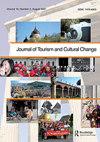伊斯坦布尔的过度旅游:对非政府组织观点的解释性研究
IF 2.5
4区 管理学
Q2 HOSPITALITY, LEISURE, SPORT & TOURISM
引用次数: 3
摘要
摘要尽管游客人数的增加和拥挤是过度旅游最明显的指标,但有必要确定决定城市过度旅游感知的不同政治、法律、经济和文化现象。本研究旨在通过举例说明哪些关键因素与伊斯坦布尔的过度旅游观念有关,为类似目的地解决过度旅游问题确定关键步骤。在定性方法的范围内选择了一个案例研究设计。数据通过半结构化访谈获得,并进行内容分析。采访了在伊斯坦布尔开展活动的非政府组织的代表。研究结果揭示了关于过度旅游的三个主要主题:现状指标、过度旅游指标和反应指标。虽然旅游形象和区域集聚是当前旅游业、公共空间、住房和绅士化的突出问题,但没有治理的政策被强调为过度旅游问题。城市化发展、城市文化和城市意识是建议的关键反应。与许多其他目的地不同,人们已经确定,伊斯坦布尔的过度旅游现象不是由游客数量引起的,而是由对所实施政策的批评引起的。本文章由计算机程序翻译,如有差异,请以英文原文为准。
Overtourism in Istanbul: an interpretative study of non-governmental organizational views
ABSTRACT Although increases in tourist arrivals and crowding are the most clearly perceived indicators of overtourism, it is necessary to identify the different political, legal, economic, and cultural phenomena that determine the perception of overtourism in cities. This study aims to identify critical steps for similar destinations to solve the problem of overtourism by exemplifying which critical factors are associated with the perception of overtourism in Istanbul. A case study design was chosen within the scope of the qualitative method. Data were obtained via semi-structured interviews and subjected to content analysis. Interviews were conducted with representatives of NGOs operating in Istanbul. The findings revealed three main themes regarding the perception of overtourism: indicators of the current situation, indicators of overtourism, and indicators of reaction. While the tourist profile and regional agglomeration stand out as the problems of current tourism, public space, housing, and gentrification, policies without governance are emphasized as overtourism problems. Development in urbanization, urban culture, and urban consciousness are key reactions recommended. Unlike many other destinations, it has been determined that the phenomenon of overtourism in Istanbul is perceived and questioned not by the number of tourists but by the criticism of the policies implemented.
求助全文
通过发布文献求助,成功后即可免费获取论文全文。
去求助
来源期刊

Journal of Tourism and Cultural Change
HOSPITALITY, LEISURE, SPORT & TOURISM-
CiteScore
5.10
自引率
9.10%
发文量
31
期刊介绍:
Journal of Tourism and Cultural Change ( JTCC ) is a peer-reviewed, transdisciplinary and transnational journal. It focuses on critically examining the relationships, tensions, representations, conflicts and possibilities that exist between tourism/travel and culture/cultures in an increasingly complex global context. JTCC provides a forum for debate against the backdrop of local, regional, national and transnational understandings of identity and difference. Economic restructuring, recognitions of the cultural dimension of biodiversity and sustainable development, contests regarding the positive and negative impact of patterns of tourist behaviour on cultural diversity, and transcultural strivings - all provide an important focus for JTCC . Global capitalism, in its myriad forms engages with multiple ''ways of being'', generating new relationships, re-evaluating existing, and challenging ways of knowing and being. Tourists and the tourism industry continue to find inventive ways to commodify, transform, present/re-present and consume material culture. JTCC seeks to widen and deepen understandings of such changing relationships and stimulate critical debate by: -Adopting a multidisciplinary approach -Encouraging deep and critical approaches to policy and practice -Embracing an inclusive definition of culture -Focusing on the concept, processes and meanings of change -Encouraging trans-national/transcultural perspectives
 求助内容:
求助内容: 应助结果提醒方式:
应助结果提醒方式:


